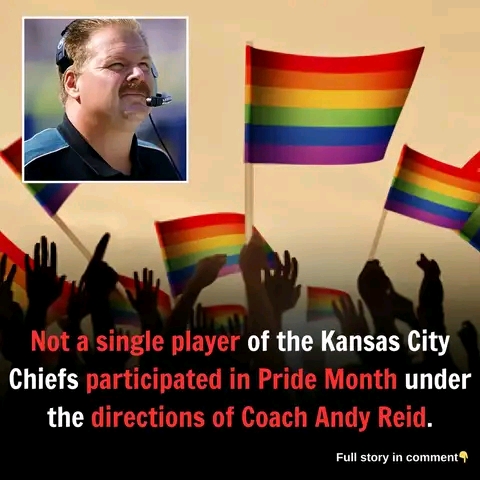CELEBRITY
Not a single player of the Kansas City Chiefs participated in Pride Month under the directions of Coach Andy Reid.

Not a single player of the Kansas City Chiefs participated in Pride Month under the directions of Coach Andy Reid.
In recent years, sports teams and athletes have increasingly become involved in various social causes and movements, using their platforms to promote inclusivity and diversity. Pride Month, celebrated each June, is one such occasion where LGBTQ+ pride and rights are highlighted and supported across various sectors, including professional sports. However, this year, the Kansas City Chiefs, a prominent NFL team, took a different approach, as not a single player participated in Pride Month activities under the directions of their head coach, Andy Reid. This decision has sparked discussions and debates among fans, sports analysts, and the broader public about its implications and underlying reasons.
Coach Andy Reid, a respected and experienced figure in the NFL, has been at the helm of the Kansas City Chiefs since 2013. Known for his strategic mind and leadership, Reid has guided the team to multiple successful seasons, including a Super Bowl victory in 2019. His influence on the team is substantial, and his directions often play a significant role in shaping the team’s public image and participation in various events.
The absence of participation by the Kansas City Chiefs players in Pride Month is notable given the growing trend of sports organizations actively supporting LGBTQ+ rights. Many teams and athletes have embraced Pride Month by participating in parades, wearing rainbow themed apparel, and engaging in community outreach. This participation not only supports LGBTQ+ communities but also reflects a broader commitment to inclusivity and diversity.
The decision by Coach Reid and the Chiefs to refrain from such activities this year has led to various interpretations and reactions. Some view it as a deliberate choice aligned with personal or organizational beliefs, while others see it as a missed opportunity to support a marginalized community. Understanding the context behind this decision requires a nuanced examination of both the internal dynamics of the team and broader societal influences.












